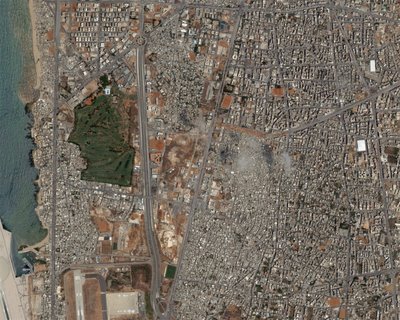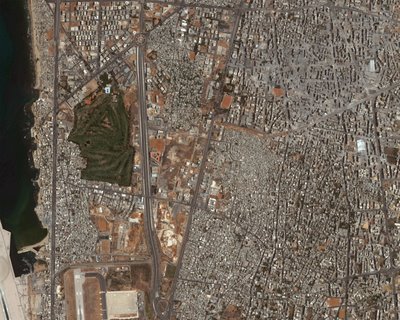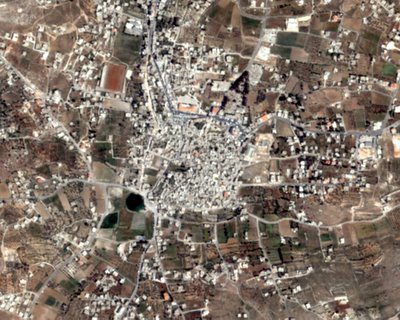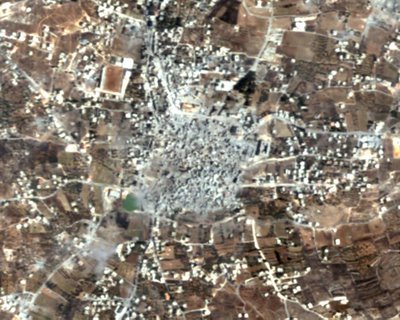Israel accused of war crimes by Amnesty; organisation calls for international investigation.



Another case of just confirming what you already knew:
Amnesty International delegates in south Lebanon reported that in village after village the pattern was similar: the streets, especially main streets, were scarred with artillery craters along their length. In some cases cluster bomb impacts were identified. Houses were singled out for precision-guided missile attack and were destroyed, totally or partially, as a result. Business premises such as supermarkets or food stores and auto service stations and petrol stations were targeted, often with precision-guided munitions and artillery that started fires and destroyed their contents. With the electricity cut off and food and other supplies not coming into the villages, the destruction of supermarkets and petrol stations played a crucial role in forcing local residents to leave. The lack of fuel also stopped residents from getting water, as water pumps require electricity or fuel-fed generators.
Israeli government spokespeople have insisted that they were targeting Hizbullah positions and support facilities, and that damage to civilian infrastructure was incidental or resulted from Hizbullah using the civilian population as a "human shield". However, the pattern and scope of the attacks, as well as the number of civilian casualties and the amount of damage sustained, makes the justification ring hollow. The evidence strongly suggests that the extensive destruction of public works, power systems, civilian homes and industry was deliberate and an integral part of the military strategy, rather than "collateral damage" – incidental damage to civilians or civilian property resulting from targeting military objectives.
and:
Israel has launched widespread attacks against public civilian infrastructure, including power plants, bridges, main roads, seaports and Beirut’s international airport. Such objects are presumed to be civilian. Israeli officials told Amnesty International that the potential military use of certain items, such as electricity and fuel, renders them legitimate military targets. However, even if it could be argued that some of these objects could qualify as military objectives (because they serve a dual purpose), Israel is obligated to ensure that attacking these objects would not violate the principle of proportionality. For example, a road that can be used for military transport is still primarily civilian in nature. The military advantage anticipated from destroying the road must be measured against the likely effect on civilians, especially the most vulnerable, such as those requiring urgent medical attention. The same considerations apply to electricity and fuel, among other items.
Similarly critical is the obligation that Israel take "constant care to spare civilians, the civilian population, civilian objects, from attack". This requirement to take precautionary measures in launching attacks includes choosing only means and methods of attack "with a view to avoiding, and in any event to minimizing, incidental loss of civilian life, injury to civilians and damage to civilian objects".
It is also forbidden to use starvation as a method of warfare, or to attack, destroy, remove or render useless objects indispensable to the survival of the civilian population. Some of the targets chosen – water pumping stations and supermarkets, for example – raise the possibility that Israel may have violated the prohibition against targeting objects indispensable to the survival of the civilian population.
Israel has asserted that Hizbullah fighters have enmeshed themselves in the civilian population for the purpose of creating "human shields". While the use of civilians to shield a combatant from attack is a war crime, under international humanitarian law such use does not release the opposing party from its obligations towards the protection of the civilian population.
Many of the violations examined in this report are war crimes that give rise to individual criminal responsibility. They include directly attacking civilian objects and carrying out indiscriminate or disproportionate attacks. People against whom there is prima facie evidence of responsibility for the commission of these crimes are subject to criminal accountability anywhere in the world through the exercise of universal jurisdiction.
also:
Over the many years of the conflict between Hizbullah and Israel, both sides have repeatedly committed grave violations of international humanitarian law without any accountability. The Israeli authorities have investigated a few incidents, and have stated that they are still investigating some of the incidents in the latest outbreak of hostilities, but the methods and outcomes of these investigations have never been properly disclosed. They fall far short of the standards required. No investigation on violations of international humanitarian law by Hizbullah is known to have been conducted by the Lebanese authorities. If respect for rules of war is ever to be taken seriously, a proper investigation of their violation by both parties of the recent conflict is imperative.
Amnesty International calls for the immediate establishment of a comprehensive, independent and impartial inquiry into violations of international humanitarian law by both Hizbullah and Israel in the conflict. The inquiry should examine in particular the impact of this conflict on the civilian population. It should propose effective measures to hold accountable those responsible for crimes under international law, and to ensure that the victims receive full reparation.
Amnesty International has asked the UN Security Council and the UN Human Rights Council to request the UN Secretary General to establish a panel of independent experts to conduct this inquiry. They should include experts with proven expertise in investigating compliance with international humanitarian and human rights law, in military matters, as well as in forensics and ballistics. The experts should receive all necessary assistance and resources. The outcome of the inquiry should be made public and include recommendations aimed at ending and preventing further violations.
Amnesty will no doubt quickly come under attack from Zionist apologists for not dealing with the attacks by Hizbullah in the same report; the report only states that are being addressed elsewhere. Amnesty's report however is damning and deserves reading in full. At least two hospitals were completely destroyed, including the one in Bint Jbeil, the "Hizbullah stronghold". The rest of the town was similarly reduced to rubble, as can be seen in the satellite images provided by Amnesty with the report. At least 20 fuel depots were destroyed, the Lebanese government estimates that 200,000 square miles of road were completely devastated, while the number of the population unemployed is estimated now to be touching 75%. $200 million worth of damage has been estimated as being done to the industrial sector in the country. The oil slick, caused by the destruction of the fuel tanks at the power station in Jiyyeh, is now feared to have sank to the seabed, suffocating sea life.
All of this is increasing the pressure on Israel to pay reparations for the almost unbelievable damage done to the country by Israel's bombardment. As Brian Whitaker points out Comment is Free, Israel was told by the UN in 1968 that Lebanon was right to expect "appropriate redress" for the destruction of Beirut's airport. The bombing raid then was in response to a PFLP attack on an El Al plane at Athens airport, which killed one Israeli. The problem would be actually forcing Israel to pay; she predictably never paid the estimated $43 million worth of damage done to the airport. One way of paying for the damage might be for the UN to force the US to divert its economic and military aid to Israel to the Lebanon instead: last year the US gave $360 million in economic aid and a staggering $2.22 billion in military aid. President Bush has promised to increase aid to Lebanon to $230 million this year; that this doesn't even touch either of the amounts given last year to Israel speaks volumes.
Meanwhile, France is predictably getting a lot of stick for not keeping its word in sending the amount of forces it originally seemed to be suggesting it would to attempt to keep the peace. Allegations of cheese-eating surrender monkeyism are running rampant, coming from the usually sane Jonathan Freedland. As Daniel Davies eloquently puts it, everyone seems to have forgotten that a ceasefire would not have happened without France's attempts from the beginning to broker one. Despite the delays, the fact that innocent civilians are now not being slaughtered on a daily basis on both sides is worth celebrating on its own. While France was trying to do this, the US and UK were intent on keeping the war going long enough for Israel to reach its objectives: the destruction of Hizbullah, or at least the purging of the militia from south of the Litani river. It achieved neither, only succeeding in becoming even more of a pariah nation in the eyes of millions worldwide, if not in the minds of governments. Italy at least appears to be picking up in the baton, in offering 3,000 troops, while other nations such as Indonesia, Malaysia and Bangladesh have all offered soldiers, but Israel has balked because it doesn't have diplomatic relations with any of them. That these soldiers would be wearing the blue caps of the UN seems to have passed them by.
Freedland is always angry that the plan for the unilateral withdraw from the West Bank has been discarded for now. Freeland doesn't seem to release than a withdrawal that only leads to the West Bank becoming another open air prison similar to Gaza is no better than the current occupation. Some settlements may have been dismantled, but not ones such as Ariel which almost cut the territory in two. The result would have been an emasculated, unconnected, disjointed territory nothing like that which existed in 1967. That this would never have led to a peace that the Palestinians can accept passes Freeland by completely. He also criticises those of us who declared that "we are all Hizbullah now". His attack is rather mild compared to those who suggested that the demonstrators wanted all the Jews to die, or that the marchers were unknowingly supporting the establishment of an Islamic caliphate, yet it still misses the point entirely. Those of us who marched were showing our solidarity with the Lebanese people who had been dismissed by the Israelis as terrorists for staying in the south of the country; if they were Hizbullah, so were we.
As ever, the only way forward for the region is a negotiated peace. That Israel appears to have completely abandoned this, and shows no sign of wanting to return to the diplomatic table gives the lie to the idea that the Israeli government wants peace. The Israeli people might, but their representatives do not. This could not be better illustrated than by Olmert's continued attempts to abduct democratically elected members of the Hamas dominated government. A Palestinian minister was yesterday charged with being a member of the organisation. For once, I agree with George Galloway, in his now widely viewed interview with Sky News: no one knows the names of those killed by Israel, or the ministers held for daring to put themselves up for election, but everyone knows the names of the soldiers captured by Hamas and Hizbullah. That there is no international outcry over Israel's contempt for Palestinian democracy is disgraceful; it is little different from the way that the military junta in Burma holds Aung San Suu Kyi without charge, yet that regularly leads to condemnation around the globe. This cynicism is reflected in the way that only 25% of Lebanese think peace with Israel is possible; it is, but without a sea change in the views and attitudes of all the major parties, this situation will continue for yet more decades.
Curious Hamster also has an excellent post on Israeli censorship.

Post a Comment